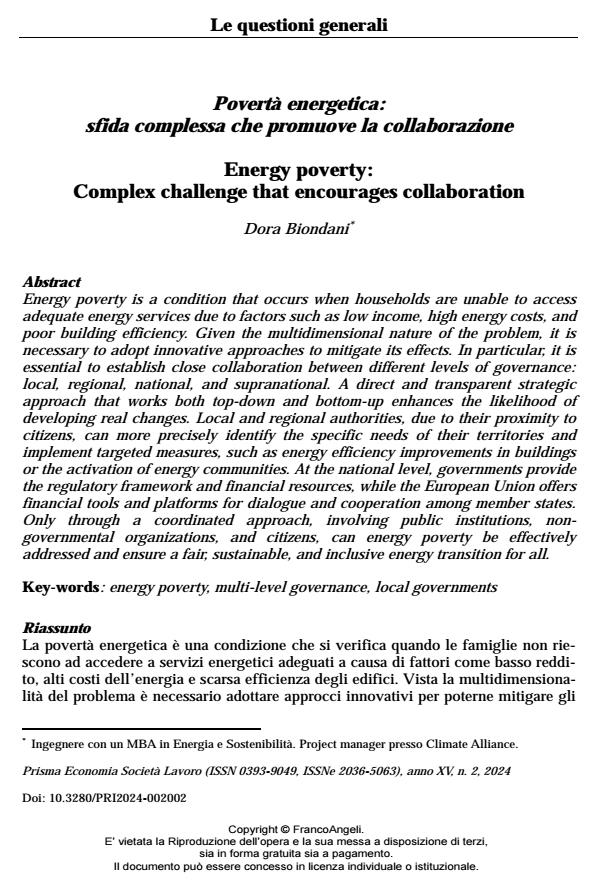Energy poverty: Complex challenge that encourages collaboration
Journal title PRISMA Economia - Società - Lavoro
Author/s Dora Biondani
Publishing Year 2025 Issue 2024/2
Language Italian Pages 9 P. 13-21 File size 91 KB
DOI 10.3280/PRI2024-002002
DOI is like a bar code for intellectual property: to have more infomation
click here
Below, you can see the article first page
If you want to buy this article in PDF format, you can do it, following the instructions to buy download credits

FrancoAngeli is member of Publishers International Linking Association, Inc (PILA), a not-for-profit association which run the CrossRef service enabling links to and from online scholarly content.
Energy poverty is a condition that occurs when households are unable to access adequate energy services due to factors such as low income, high energy costs, and poor building efficiency. Given the multidimensional nature of the problem, it is necessary to adopt innovative approaches to mitigate its effects. In particular, it is essential to establish close collaboration between different levels of governance: local, regional, national, and supranational. A direct and transparent strategic approach that works both top-down and bottom-up enhances the likelihood of developing real changes. Local and regional authorities, due to their proximity to citizens, can more precisely identify the specific needs of their territories and implement targeted measures, such as energy efficiency improvements in buildings or the activation of energy communities. At the national level, governments provide the regulatory framework and financial resources, while the European Union offers financial tools and platforms for dialogue and cooperation among member states. Only through a coordinated approach, involving public institutions, non-governmental organizations, and citizens, can energy poverty be effectively addressed and ensure a fair, sustainable, and inclusive energy transition for all.
La povertà energetica è una condizione che si verifica quando le famiglie non riescono ad accedere a servizi energetici adeguati a causa di fattori come basso reddito, alti costi dell’energia e scarsa efficienza degli edifici. Vista la multidimensionalità del problema è necessario adottare approcci innovativi per poterne mitigare gli effetti. In particolare è fondamentale stabilire una collaborazione stretta tra diversi livelli di governance: locale, regionale, nazionale e sovranazionale. Un diretto e trasparente approaccio strategico che agisca sia top down che bottom-up rinforza le probabilitá di sviluppare concreti cambiamenti. Gli enti locali e regionali, grazie alla loro prossimità ai cittadini, possono identificare con maggiore precisione i bisogni specifici dei territori e attuare misure mirate, come l’efficientamento energetico delle abitazioni o l’attivazione di comunità energetiche. A livello nazionale, i governi forniscono il quadro normativo e le risorse economiche, mentre l’Unione Europea offre strumenti finanziari e piattaforme per il dialogo e la cooperazione tra Stati membri. Solo attraverso un approccio coordinato, che coinvolga istituzioni pubbliche, organizzazioni non governative e cittadini, è possibile contrastare efficacemente la povertà energetica e garantire una transizione energetica equa, sostenibile e inclusiva per tutti.
Keywords: energy poverty, multi-level governance, local governments
Dora Biondani, Povertà energetica: sfida complessa che promuove la collaborazione in "PRISMA Economia - Società - Lavoro" 2/2024, pp 13-21, DOI: 10.3280/PRI2024-002002